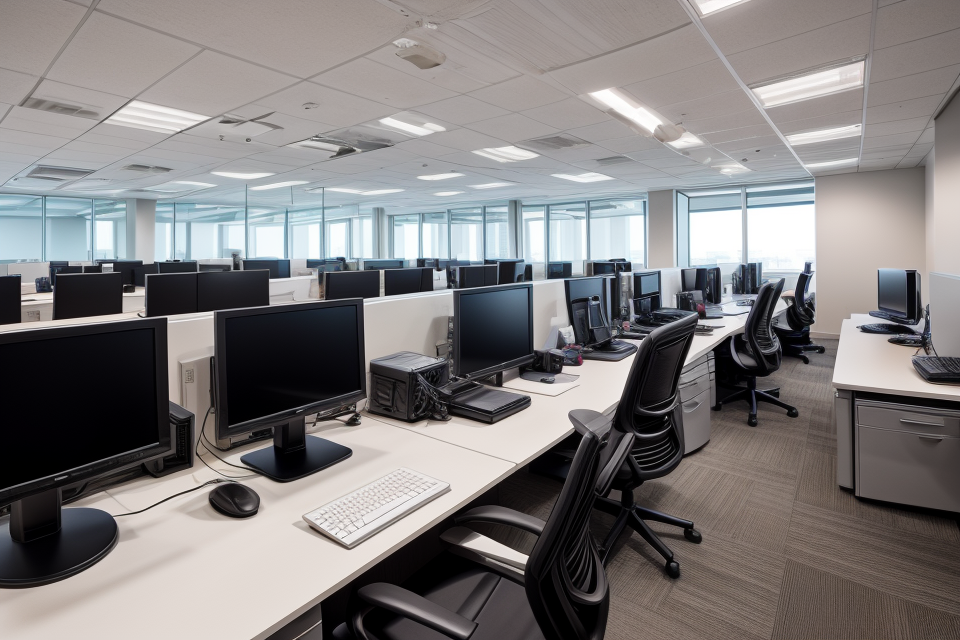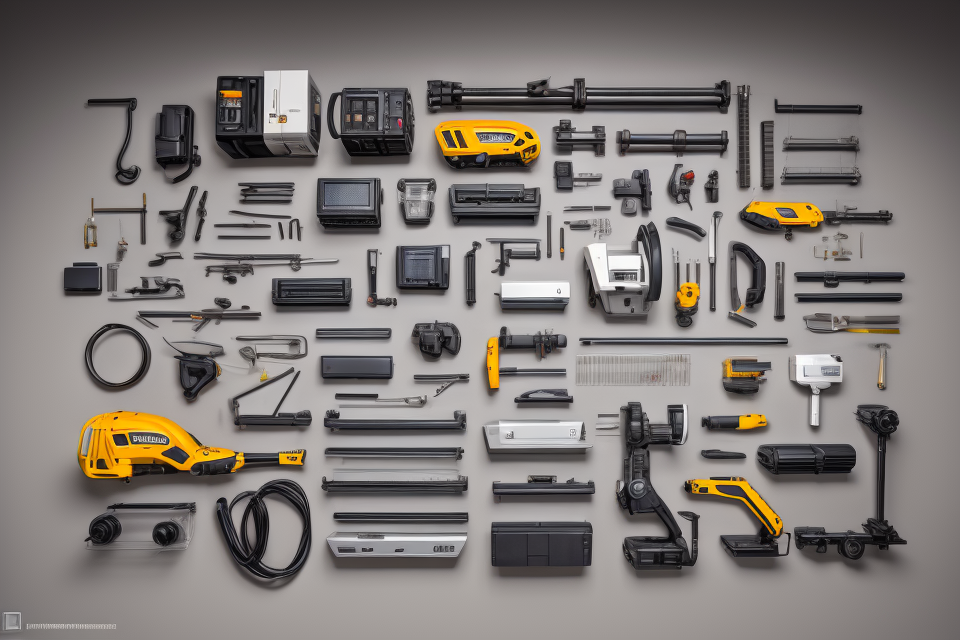In a professional setting, equipment and tools refer to the physical resources and instruments that are required to perform a specific task or job. These resources can range from simple hand tools such as screwdrivers and hammers to complex machinery such as computers and industrial robots. The quality and efficiency of the equipment and tools used can greatly impact the outcome of a project and the safety of those involved. Understanding the meaning and importance of equipment and tools is crucial for any professional in any field. In this article, we will explore the significance of equipment and tools in a professional setting and how they can contribute to the success of a project.
In a professional setting, equipment and tools refer to the physical objects and devices that are used to perform specific tasks or jobs. These can include things like computers, software, machinery, instruments, and other specialized tools that are necessary for a particular industry or field. Equipment and tools are essential for getting work done efficiently and effectively, and they can greatly impact the productivity and success of a business or organization. It is important for professionals to have access to the right equipment and tools to do their jobs well, and to keep them in good working condition to ensure they can be used safely and effectively.
Understanding Equipment and Tools in a Professional Setting
Definition of Equipment and Tools
In a professional setting, equipment refers to the physical objects and machinery used in a particular field or industry. This can include things like computers, printers, copiers, and other large machinery that is necessary for completing tasks. Equipment is typically expensive and requires maintenance and upkeep to ensure it is in good working order.
Tools, on the other hand, refer to the smaller, handheld objects used to accomplish specific tasks. These can include things like screwdrivers, hammers, pliers, and other tools that are designed to make specific tasks easier and more efficient. Tools are often portable and can be used in a variety of settings, making them an essential part of any professional’s toolkit.
Both equipment and tools are necessary for completing tasks in a professional setting. Without the proper equipment and tools, professionals may find themselves unable to complete tasks efficiently or effectively. As such, it is important for professionals to have access to high-quality equipment and tools that are well-maintained and up-to-date.
Importance of Equipment and Tools in a Professional Setting
In today’s fast-paced business environment, it is essential to have the right equipment and tools to perform tasks efficiently and effectively. The right equipment and tools can make a significant difference in the quality of work, productivity, accuracy, and safety. Here are some reasons why equipment and tools are important in a professional setting:
- Improved Efficiency: Equipment and tools can help workers complete tasks more quickly and efficiently. For example, a construction worker with the right tools can build a structure faster than one without them. Similarly, a medical professional with the right equipment can perform procedures more efficiently.
- Enhanced Accuracy: The right equipment and tools can improve accuracy, which is crucial in many industries. For instance, precision measuring tools can help engineers and architects ensure that their designs are accurate, while medical equipment can help doctors make precise diagnoses.
- Safety: Equipment and tools can also improve safety in the workplace. For example, safety equipment such as hard hats, safety glasses, and protective gloves can prevent injuries. Similarly, machines with safety features can reduce the risk of accidents.
- Consistency: Equipment and tools can help ensure consistency in the quality of work. For example, a baker who uses a consistent oven temperature can produce consistent baked goods. Similarly, a mechanic who uses the same tools can ensure that all repairs are done to the same standard.
- Training and Development: The use of equipment and tools can also be an opportunity for training and development. For example, a worker who is trained to use specialized equipment can develop new skills and become more valuable to the company.
In conclusion, equipment and tools are essential in a professional setting as they can improve efficiency, accuracy, safety, consistency, and provide opportunities for training and development. Therefore, it is crucial to invest in the right equipment and tools to ensure that your business can perform at its best.
Types of Equipment and Tools
Equipment and tools play a crucial role in a professional setting as they are essential for the efficient and effective completion of tasks. The type of equipment and tools used in a professional setting will vary depending on the industry and the specific job requirements. Here are some examples of the different types of equipment and tools used in various professional settings:
- Computer hardware and software: In today’s digital age, computer hardware and software are essential tools in almost every professional setting. This includes devices such as desktop computers, laptops, tablets, and smartphones, as well as software programs such as word processing, spreadsheet, and graphic design software.
- Construction equipment: Construction sites require specialized equipment such as bulldozers, cranes, excavators, and other heavy machinery to complete construction projects.
- Medical equipment: Medical professionals rely on a variety of equipment and tools to diagnose and treat patients. This includes medical imaging equipment such as X-ray machines, MRI machines, and ultrasound machines, as well as surgical instruments and hospital beds.
- Scientific equipment: Scientists use specialized equipment to conduct experiments and research. This includes lab equipment such as microscopes, test tubes, and beakers, as well as more complex equipment such as spectrometers and particle accelerators.
- Art supplies: Artists require a variety of supplies to create their work, including paints, brushes, canvas, and drawing tools.
- Musical instruments: Musicians need specialized equipment to create and perform music, including instruments such as guitars, pianos, drums, and horns.
In conclusion, the type of equipment and tools used in a professional setting will vary depending on the industry and specific job requirements. Having access to the right equipment and tools is essential for completing tasks efficiently and effectively.
Selecting the Right Equipment and Tools for Your Business
Factors to Consider
When selecting equipment and tools for your business, there are several factors to consider to ensure that you make the right investment. Here are some key factors to keep in mind:
Cost
One of the most important factors to consider when selecting equipment and tools is cost. You need to determine how much you can afford to spend and what your budget is. It’s important to keep in mind that while it’s essential to consider the cost, it’s also crucial to consider the quality and durability of the equipment and tools you’re purchasing. Cheap equipment and tools may seem like a good idea initially, but they can end up costing you more in the long run due to their poor quality and short lifespan.
Quality
Quality is another crucial factor to consider when selecting equipment and tools for your business. You want to ensure that the equipment and tools you purchase are reliable and will last for a long time. It’s important to research the different brands and models available and read reviews to determine the quality of the equipment and tools before making a purchase.
Durability
Durability is also an essential factor to consider when selecting equipment and tools for your business. You want to ensure that the equipment and tools you purchase can withstand the wear and tear of regular use. Look for equipment and tools that are made from high-quality materials that can withstand the demands of your business.
Functionality
Functionality is another crucial factor to consider when selecting equipment and tools for your business. You want to ensure that the equipment and tools you purchase can perform the tasks you need them to do. Consider the specific requirements of your business and choose equipment and tools that meet those requirements.
Compatibility with Existing Equipment
Compatibility with existing equipment is also an essential factor to consider when selecting equipment and tools for your business. If you already have equipment and tools in place, you want to ensure that any new equipment and tools you purchase are compatible with them. This will help to ensure that you have a seamless workflow and that your employees can work efficiently.
Safety Features
Finally, safety features are an essential factor to consider when selecting equipment and tools for your business. You want to ensure that the equipment and tools you purchase are safe to use and meet all relevant safety standards. Look for equipment and tools that have safety features such as automatic shut-off switches, safety guards, and warning labels.
By considering these factors, you can ensure that you select the right equipment and tools for your business, which will help to improve efficiency, productivity, and profitability.
Conducting Research
Researching different options is key to selecting the right equipment and tools for your business. This can involve reading reviews, talking to other professionals in your field, and testing out different products. Here are some tips to help you conduct effective research:
- Start by identifying your specific needs and requirements. Consider what tasks you need to perform, what your budget is, and what features are most important to you.
- Look for reviews and ratings from other professionals in your field. This can give you a good idea of which products are highly rated and well-regarded by others in your industry.
- Talk to other professionals in your field to get their recommendations. This can be a great way to get insider knowledge and to learn about products that may work well for your specific needs.
- Test out different products before making a final decision. This can help you get a feel for how the equipment or tools work and whether they are a good fit for your business.
By conducting thorough research, you can ensure that you select the right equipment and tools for your business. This can help you increase efficiency, productivity, and overall success in your professional setting.
Working with a Professional
In some cases, it may be helpful to work with a professional who specializes in equipment and tool selection. This could be a consultant or an industry expert who can provide valuable insights and recommendations. Here are some key benefits of working with a professional:
- Expertise: A professional has extensive knowledge and experience in selecting equipment and tools for various industries. They can help you identify the most suitable products for your specific needs and budget.
- Objectivity: A professional can provide an unbiased opinion on the best equipment and tools for your business. They are not influenced by brand loyalty or personal preferences, and can help you make an informed decision.
- Cost-effectiveness: A professional can help you avoid costly mistakes by ensuring that you select equipment and tools that are both effective and affordable. They can also help you negotiate the best prices and terms with suppliers.
- Time-saving: A professional can save you time and effort by streamlining the selection process. They can conduct research, evaluate options, and provide recommendations, allowing you to focus on other aspects of your business.
When working with a professional, it’s important to establish clear communication and set expectations. You should provide them with detailed information about your business needs, budget, and preferences, and ask for regular updates and progress reports. This will help ensure that the process is efficient and effective, and that you end up with the right equipment and tools for your business.
Caring for and Maintaining Your Equipment and Tools
Importance of Proper Care and Maintenance
Proper care and maintenance of your equipment and tools is essential for ensuring their longevity and performance. Neglecting to maintain your equipment can result in decreased efficiency, increased downtime, and even equipment failure, which can be costly and time-consuming to repair. On the other hand, regularly maintaining your equipment can extend its lifespan, reduce the risk of breakdowns, and improve its overall performance.
Proper care and maintenance can involve a variety of tasks, depending on the type of equipment and tools you are using. For example, regular cleaning can help to remove dirt, dust, and debris that can accumulate over time and interfere with the proper functioning of your equipment. Oiling and lubricating moving parts can help to reduce friction and wear, which can extend the lifespan of your equipment. Sharpening blades and other cutting edges can help to maintain their sharpness and accuracy, which is particularly important for tools such as knives, saws, and drills.
More extensive repairs and upgrades may also be necessary from time to time. For example, if you notice that your equipment is making unusual noises or not functioning as well as it should, it may be time for a tune-up or repair. Similarly, if you want to improve the performance of your equipment, you may need to upgrade certain components or install new software or firmware.
Overall, the importance of proper care and maintenance cannot be overstated. By taking good care of your equipment and tools, you can ensure that they are always in top condition and ready to perform at their best.
Tips for Proper Care and Maintenance
Maintaining your equipment and tools is essential to ensure they function correctly and last longer. Here are some tips for proper care and maintenance:
Follow manufacturer instructions for cleaning and maintenance
It is crucial to follow the manufacturer’s instructions when it comes to cleaning and maintaining your equipment and tools. This ensures that you use the right cleaning solutions and maintenance procedures, which can help prolong the lifespan of your tools.
Keep tools and equipment clean and well-organized
Keeping your tools and equipment clean and well-organized is an essential part of proper care and maintenance. This not only helps you find the tools you need quickly but also prevents damage to your equipment.
Regularly inspect equipment for damage or wear and tear
Regularly inspecting your equipment for damage or wear and tear is essential to prevent breakdowns and ensure that your tools continue to function correctly. Look for signs of damage, such as rust, cracks, or worn-out parts, and take action to repair or replace them as needed.
Store equipment and tools properly to prevent damage
Proper storage is crucial to prevent damage to your equipment and tools. Make sure to store them in a dry, clean, and well-ventilated area, away from direct sunlight and moisture. It is also essential to store tools and equipment in their designated places to prevent damage and make them easier to find when you need them.
Have any necessary repairs or upgrades performed by a professional
Having any necessary repairs or upgrades performed by a professional is essential to ensure that your equipment and tools function correctly and safely. This is particularly important for complex machinery and equipment that requires specialized knowledge and expertise to repair or upgrade.
FAQs
1. What is the meaning of equipment and tools in a professional setting?
Equipment and tools refer to the physical resources and materials that are used to perform a specific task or job in a professional setting. These can include things like computers, software, machinery, instruments, and other specialized tools that are necessary for the job. The specific equipment and tools required will depend on the industry and the type of work being done.
2. Why are equipment and tools important in a professional setting?
Equipment and tools are essential in a professional setting because they enable workers to perform their jobs efficiently and effectively. They can help increase productivity, accuracy, and safety, and can also help workers to complete tasks that would otherwise be impossible or impractical to do by hand. Having access to the right equipment and tools can also help to improve the quality of the work produced and increase customer satisfaction.
3. What are some examples of equipment and tools used in different industries?
There are many different types of equipment and tools used in various industries. For example, in the construction industry, workers may use things like hammers, saws, drills, and ladders. In the medical field, professionals may use stethoscopes, scalpels, and X-ray machines. In the technology industry, workers may use computers, servers, and other specialized equipment to perform their jobs. The specific equipment and tools used will depend on the industry and the type of work being done.
4. How are equipment and tools typically acquired by a professional setting?
Equipment and tools are typically acquired by a professional setting through a combination of purchasing and leasing. In some cases, businesses may choose to purchase equipment and tools outright, while in other cases they may lease them from a third party. Some businesses may also choose to rent equipment and tools on a short-term basis as needed. The specific method of acquiring equipment and tools will depend on the business’s needs and financial resources.
5. How are equipment and tools maintained in a professional setting?
Equipment and tools are typically maintained in a professional setting through regular inspection, cleaning, and repair. Businesses may have dedicated maintenance staff or may contract with third-party maintenance companies to handle these tasks. Regular maintenance is important to ensure that equipment and tools are in good working order and to prevent breakdowns that could disrupt business operations.










